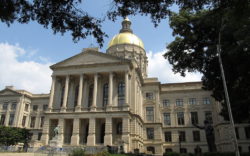The stage has been set for the most hard-fought issue of this legislative session: revising Georgia’s transportation taxes. The House leadership introduced a bill last week, HB 170, that will be the starting point for a debate certain to last up until adjournment day. Supporters of the bill, who include Gov. Nathan Deal and Speaker David Ralston, call it a “bold” plan to raise $1 billion a year for the state’s transportation needs.
“This is a bill which we believe will lead our state into the 21st Century,” Ralston declared.
Those who lose the most under the proposed legislation—local governments—complain that the Legislature wants to take more than $500 million away from them.
Those are the battle lines the two sides have established. HB 170 would dramatically revise the motor-fuel tax charged on the retail sale of gasoline. Currently, that levy includes an excise tax of 7.5 cents per gallon, plus a state sales tax of 4 percent and a local sales tax of 3 percent. Under the proposed bill, that would be converted to a flat excise tax of 29.2 cents per gallon indexed to increase as inflation and vehicle fuel efficiency increase. There would no longer be a state sales tax collected on motor fuel, and the variety of local-option sales taxes would be phased out.
The bill’s supporters claim it will not result in an increase in state taxes, but that statement is not entirely accurate. The current mix of excise and sales taxes totals roughly 27 cents per gallon. The 29.2 cents per gallon excise tax spelled out in the bill would thus amount to a small tax increase at the state level.
The indexing of the excise tax puts in place a mechanism by which it could be automatically increased as inflation goes up, without legislators ever having to vote on those future tax increases.
Those who drive cars powered by electricity, natural gas or propane would be required to pay an alternative fuel tax of $200 or $300 a year under the proposed bill, which would be a tax increase for them. Most importantly, HB 170 would result in a transfer to the state treasury of more than $500 million in revenues each year that now flow to local governments through their sales taxes on gasoline. That revenue shift would require city governments, county commissions and school boards to raise other taxes to make up for the loss of motor-fuel revenues.
As one city official observed, “This is a tax grab.” That is true: The state would grab $500 million in tax revenues each year from local governments, who then would be under pressure to vote for politically unpopular tax increases to make up for the loss.
Local government officials are already pushing back hard against HB 170 as it is currently written. They successfully opposed an attempt by then-Speaker Glenn Richardson in 2007 and 2008 to pass a “GREAT” tax plan that would have eliminated property taxes but would also have taken the authority for setting local taxes away from local governments and moved it to the state.
The anti-tax activists are also not pleased with what the House leadership is proposing. “They absolutely have not met the criteria for more funding,” said tea party leader Debbie Dooley. “They continue to be fiscally irresponsible with tax dollars.”
The two armies are gathered to do battle. On one side, you have the highway contractors and business groups like the Georgia Chamber of Commerce who support HB 170. On the other side, you have local governments, who will be squeezed the hardest by the bill, joined by the various anti-tax groups.
It’s too early to say which side will prevail, but it should produce a very entertaining session.
Like what you just read? Support Flagpole by making a donation today. Every dollar you give helps fund our ongoing mission to provide Athens with quality, independent journalism.










